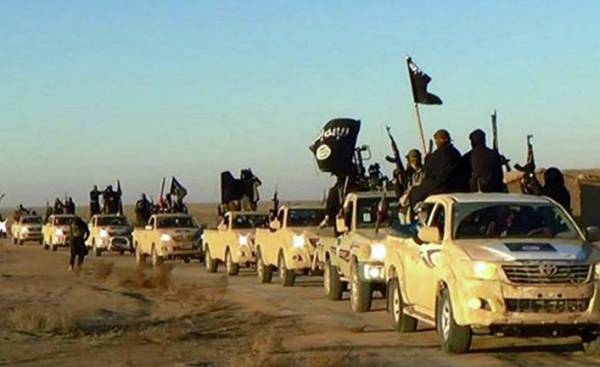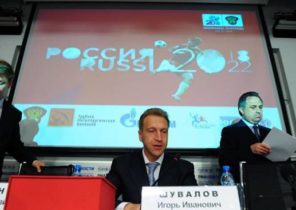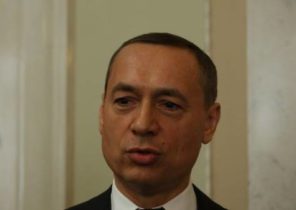
In Syria the jihadists are engaged in training of elite fighters from Central Asia and the former Soviet republics of the Caucasus. Have chosen economic model can quickly be imitators.
All these people are armed to the teeth, they are helmets and flak jackets. You can see them on the protection of the bunkers, at the storming of buildings and at the Board with marker in hand on the tactical exercises. Although the annotations to their videos on YouTube written in Cyrillic, they heard Islamic chants a Capella, which extremists often put into their promotional videos. Only here we are not dealing with the usual jihadists, and Tactical Malhama, the first private military company, which operates with Islamists from around the world.
Strategic specialization
Unlike the infamous American Blackwater (now Academi), which was accused of mass killings in Iraq, Tactical Malhama is not a huge consortium. The group consists of ten experts come from Uzbekistan and the turbulent Muslim republics of the Caucasus.
In any case, a field value is not only the size, especially in the age of social media. Malhama Tactical promoting their services on various digital platforms, and its tireless marketing, ultimately bore fruit. Today, her technical and tactical skills are used in terrorist operations in Syria and other countries. The success of the group is largely related to its strategic interests: the overthrow of the Assad regime and its replacement with a strict Islamist government.
It is headed by 24-year-old Uzbek Abu Rafik. Little is know about it except for its lightning-fast movements on social networks, where it spreads around fake names and information to confuse intelligence services. Virtually all posted online photos and video, he covers his face with a handkerchief, leaving only dark eyes and (usually unkempt) long black hair. He is fluent in Russian, Uzbek with a slight accent.
Syria — a boon for mercenaries
Since starting in may 2016 business Malhama Tactical in Syria is gaining momentum. Bands like “Fatah al-sham” (an organization banned in Russia — approx.ed.)) and Islamic party of Turkestan (Uighur extremists from China’s Xinjiang province) use the services of the company and its military experience. Moreover, its order book is full, in spite of recent setbacks like the capture of Aleppo by the Assad regime. As said Abu Rafiq in an interview with Foreign Policy via Telegram, Syria is still the main activity Malhama Tactical.
Although this is certainly not a hindrance to expansion at the international level. According to its leader, the group is ready to work wherever oppress Sunnis. He believes the China and Burma countries that could most benefit from Jihad. In addition, it is possible that Malhama Tactical can return to basics, that is, to the North Caucasus to fight the Russian government.
In November, the company posted job offers in Facebook. She needed good instructors with combat experience. In the message Malhama Tactical was seen as “fun and friendly group.” The newcomers had to be prepared for ongoing participation in the fighting, training and personal growth, cooperation with the “Fatah al-sham”. The instructors were supposed to just one day a week to rest from the Jihad. In tone, the statement was like the offer of a large industrial company and not an Islamist group, which is involved in a bloody war. Jihad has reached international level long before Malhama Tactical, but he’s hardly ever been characteristic of this entrepreneurial spirit.
The Russian question
Although Malhama Tactical was the first PMC that works exclusively with radical groups, her colleagues have long been involved in the Syrian war. This conflict, which has lasted almost six years and claimed the lives of more than 400 thousand people, was a real boon for mercenaries. In the midst of chaos, in which the “Islamic state” (banned in Russia as a terrorist organization — approx.ed.) Kurdish self-defense forces, “Fatah al-sham” and other parties are waging a fierce territorial and symbolic struggle, a private military organization only rubbing their hands. They work on all sides and in all camps.
The first PMC in Syria was the “Slavic corps”, was in Hong Kong a group of retired Russian military, which, according to the Interpreter, briefly supported the government forces in 2013. Only here to work for the Assad regime was not easy. Syrian military soldiers stole equipment from the “Slavic corps”, they were never paid for, and their escort fell tangled in the wires of the Syrian helicopter (one mercenary was wounded). The misadventures of the hull was completed in October 2013 in the desert in Eastern Syria after the victory of the rebels at Al-Sukhna. The group was disbanded and the mercenaries returned to Moscow, where an illegal military operation they were quickly detained by the FSB.
After the Kremlin’s intervention in Syria, which officially began in September of 2015, nearly 1,500 Russian mercenaries followed in the footsteps of PMC “Wagner”, which had previously provided support to the separatists in Eastern Ukraine, according to the investigation of journalists Sky News. In Syria they are supporting Assad’s regime and in contrast to the “Slavic corps” “Wagner” can count on the assistance of Moscow. It is believed that the group is headed by the former commander of a special forces military intelligence Dmitry Utkin. About “Wagner” little is known, but the group apparently followed the example of Academi, that is, acts as an elite infantry unit, under the auspices of the Russian authorities. Its fighters often arrive in the Russian military aircraft, and their training takes place on the basis of Molkino in the South-West of Russia. According to the latest data, “Wagner” is still working in Syria.
In parallel, a huge number of Russian fighters have joined the ranks of jihadist groups in their war with the Assad regime. According to the Soufan Group, in Syria there are at least 4 thousand 700 foreign fighters from the former Soviet Union. The vast majority of them came from Chechnya and Dagestan. They are usually better armed and trained than the local jihadists because some of them fought with the Russian government in the Caucasus in the 1990s and 2000s.
Russian terrorists are quickly gaining the respect of local counterparts, because they fear death even less than they do. In the ranks of ISIS and “Fath al-sham” they are called “engimas”: suicide bombers who throw themselves on the line of the enemy in order to kill as many enemies as possible and without the slightest desire to return from battle alive. Typical engimas will fight to the last cartridge, and then detonated a belt with explosives, when his position will be surrounded.
While many of their compatriots from the former Soviet Union become cannon fodder, soldiers Malhama Tactical operate a little differently. Their niche is in the juxtaposition of two universes: professional PMCs and operating in Syria jihadist movements. It consultants and arms dealers, and in some cases elite fighters.
Instructors of radical Islamists
It all seems quite logical, if you know the track record of Abu Rafika. In his own words, his adult life began with the departure from Uzbekistan to Russia. He started a family and was accepted into the prestigious airborne. In 2013 he went to Syria. Unlike the vast majority of foreign fighters, he did not join any of the existing groups, and decided to maneuver between them to maintain independence. In 2016, he founded the Malhama Tactical.
During the year instructors Malhama Tactical was involved in the preparation of the Islamists of the most radical groups (“Ahrar al-sham and Fatah al-sham”) to conduct urban combat in Aleppo. One of the video militants are trained to handle grenades and attack from ambush. On the other, the men with guns and grants provide training sweep of the building under the stern gaze of instructors Malhama Tactical.
Education is not cheap: one grenade projectile is on the black market of about 800 euros. Therefore, the training of the rebels and jihadists are usually limited to physical training and the basics of tactics.
Only here for the extremists who can afford it, lessons Malhama Tactical worth the money invested. According to an anonymous source from the European PMC, the fighters prepared Malhama Tactical, have a real advantage on the battlefield.
In addition, the soldiers of the Tactical Malhama get to play the role of special forces in various jihadist movements. In September 2016, they joined the ranks of the Islamic party of Turkestan and helped her to beat the onset of the regime forces in the South of Aleppo. However, according to Abu Rafiq, such an intervention is sporadic, and the main task remains Malhama Tactical military training and other jihadists fighting against Assad groups. It happens that the Malhama Tactical supplies them with equipment. For example, the company manufactures accessories for the extremely popular Kalashnikov. Not less popular among the militants also issued her butts and body armor.
In addition, Malhama Tactical very serious about their social media presence. The group is promoting in Facebook, YouTube, Twitter, and Vkontakte, while in the Russian social network page is still blocked. Instagram in the impression that you look at the profile of a successful weapons manufacturer. Pictures ammunition and fighters carefully crafted and always accompanied by a professionally done logo. Malhama Tactical scored 210 thousand views on YouTube and attracted a considerable audience, especially for their size and experience. For comparison, the Brigade “al-Mutasim” Syrian free army, which is 50 times bigger and six times over, barely managed to cross the mark of 110 thousand views. From Syrian rebels to Ukrainian soldiers and separatists Donetsk — comment on all publications of the group.
Pages Malhama Tactical on YouTube and Facebook are available and free lessons for jihadists. There you can learn how to make grenades, weapons to clean, to urban combat and so on. Instructors conduct online sessions on first aid, use of rocket-propelled grenades, conventional gestures and ambushes in those cases where immediate consultation is impossible.
Although Malhama Tactical demands payment for its services, Abu Rofik not want to be considered a mercenary. He says that the motivation of his group above money. “We have a different goal, we fight for the idea,” he says. In other words, it is the Jihad against Assad.
“Such structure and operation will meet more in the coming decades,” says Sean Macfeat (Sean McFate), a Professor of national defense University, USA and author of the book “the Modern mercenary”. According to him, the development of Tactical Malhama is a natural consequence of war in Syria. However, such a mixture of extremist ideology and the privatization of war speaks of a new and very disturbing trend. “We cross the threshold, when the fanatics start to pay [for military training], is a milestone in the modern war” — sure, Macfeat.
The actions of Abu Rafika attracted the attention of Moscow, which considers it a serious terrorist threat. February 7, Russian aircraft struck blow to his apartment in Idlib, killing his pregnant wife and young son and other civilians. Contrary to first reports, which are published Malhama Tactical in social media, the local source confirmed that Abu Rafic died because I left the house for a few minutes before the strike, to help their neighbors.
In any case, the influence of this jihadist PMC makes itself felt in the North of Syria, and it may appear imitators outside the Middle East. Even if Abu Rofik will die and Tactical Malhama will disappear, he has changed the course of the war with Assad, and with it, perhaps the future of the military-industrial complex.







